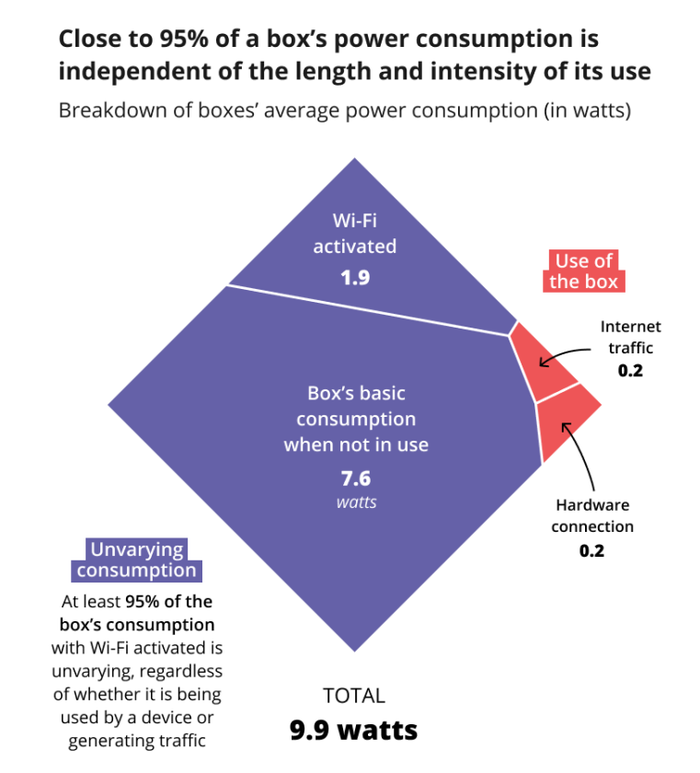Telecoms industry undermines France's energy reduction efforts
The telecoms industry is struggling to keep energy usage and CO2 emissions down in France, according to new data shared by the country's regulator.
March 25, 2024

A new digital sustainability report published by Arcep late last week shows that the telecoms equipment consumers have in their homes uses more power than fixed-line networks, whether it is being used or not, and that mobile operators in France are increasing their energy usage at a time when the country as a whole is reducing consumption.
The regulator added data on Internet routers and set-top boxes for the first time in this study, the third edition of its 'Achieving digital sustainability' report, which covers calendar 2022. And that new information proved to be its headline finding. Routers and STBs together used 3.3 Terawatt hours of power in 2022, which is three times the amount of electricity consumed by fixed-line networks. The study defines fixed networks as all operator equipment used to provide phone or Internet up to the wireline network termination point inside the customer premises.
These "massively energy hungry," as Arcep dubs them, Internet routers and STBs accounted for 0.7% of total power consumption in France.
The regulator pointed out that there was considerable variance in power consumption between the 38 models of router and 23 types of STB it studied, but it did not name and shame the equipment makers at the most power hungry end of the range.
One thing all the boxes have in common is that they all consume a large amount of energy whether or not they are actually being used; traffic makes little difference. Indeed, close to 95% of power consumption is a constant for these devices (see chart below).

"There is therefore room to reduce these devices' power consumption, thanks to sustainable design and the development of features that make it possible to put internet and set-top boxes into deep sleep mode automatically," Arcep said.
Now it just needs to get the equipment makers on board. And given the amount of noise coming out of this industry of late regarding medium-term power and emissions reduction targets, that shouldn't be too much of an ask.
Similarly, telecoms operators the world over are on a mission to cut energy usage. Or so their PR and marketing material suggests. The green agenda has been front and centre for some time, heightened by rocketing energy costs that have hit operators hard. But the data from France suggests this is proving a tough ask.
Greenhouse gas emissions are falling in France, dropping by 2.7% year-on-year in the study period, but the country's four main operators increased emissions by 2% for the second year in a row, reaching the equivalent of 382,000 tonnes of CO2.
And growth in mobile data traffic and 5G network rollouts drove a 14% increase in mobile networks' energy consumption in 2022, following a 6% hike the previous year. Fixed networks' power consumption fell by 14%, thanks to the switch from fibre to copper, but the decline was not enough to offset growth in mobile. As such, telecoms networks power consumption rose by 7% to 4.1 TWh; to provide some context, overall power consumption in France decreased by 4%.
The regulator's report also highlighted that operators are not doing enough when it comes to offering refurbished phones. Just 4% of operator handset sales were refurbished devices, versus 25% sold through other channels.
However, it's worth noting that in mid-2023 – so after the end of this study's reporting period – France's Orange was one of the telcos named as spearheading a GSMA initiative which has a target of recovering a fifth of old phones for reuse, repair or recycling by the end of the decade. The Arcep data shows how much that initiative is needed. If it gets off the ground, the data could look different in future years.
The same could be said of much of Arcep's report. Operators and vendors have been banging the sustainability drum since much longer ago than 2022, but many emissions and power commitments have come since then, and there have also been technological developments in the interim that should help too.
Nonetheless, the data is still valid and the report should serve as a warning to the industry: curtailing power usage and emissions is not going to come easy.
About the Author(s)
You May Also Like











_1.jpg?width=700&auto=webp&quality=80&disable=upscale)


.png?width=800&auto=webp&quality=80&disable=upscale)